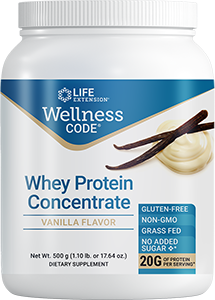
How Do HMB and Vitamin D Work Together?
Published: June 2022 | Updated: November 2023
If you're active, protein, creatine and amino acids probably are already mainstays of your supplement stack. But are they enough for lasting muscle health?
There's a strength-promoting combo you may be sleeping on. β-hydroxy-β-methylbutyrate (pronounced "beta-hydroxy-beta-methylbutyrate"), better known as HMB, has more than earned its spot in your supplement cabinet—especially when it appears alongside vitamin D.
Particularly if you want to preserve muscle mass as you age, this dynamic duo is a staple, along with physical activity and a healthy diet. Let's learn exactly how an HMB and vitamin D supplement can help you gain and maintain lean body mass.
How does age affect muscle strength?
Let's be honest: getting older comes with all kinds of unwelcome changes, from needing to wear readers just to decipher your grocery list to forgetting where you put your keys. In that same vein, the older you get, the harder it becomes to maintain muscle: after the age of 30 you can lose between 3-8% of your muscle mass per decade. This decline in strength works in two ways: it becomes harder for our bodies to build new muscle (anabolism), while it becomes easier for the muscle we do have to break down (catabolism).
Unfortunately, this is the case even if you have the necessary building blocks—like proteins and amino acids—for muscle growth. So that's why, even if you're eating plenty of protein, taking creatine, and drinking post-workout smoothies, you may not be adequately fueling your muscles.
This is something to think about, and not because you want to look good in a bathing suit. Having enough muscle mass certainly isn't just about aesthetics, and it isn't even solely about strength. Your muscles help pump blood throughout your body, stabilize your joints, manage your posture, and even help you breathe and produce heat!
That's where HMB can play an important role, not only by supporting muscle strength but also necessary muscle functions.
What does HMB do?
HMB is a metabolite derived from the amino acid leucine that helps preserve the structural integrity of your muscles, making it a great way to fight against age-related muscle decline, especially for those over the age of 65.
And that's not all. While HMB is primarily known for muscle growth and maintenance, it is first and foremost an exercise supplement—with evidence finding that this nutrient promotes exercise performance during both resistance and endurance training.
In fact, one placebo-controlled study of participants with age-related muscle decline found that individuals who supplemented with HMB enjoyed enhanced benefits of resistance training related to their muscle strength, physical performance, muscle quality and even supported a healthy inflammatory response.
Why should you take vitamin D with HMB?
Vitamin D comes with some unique benefits that complement HMB. In addition to supporting muscle health, vitamin D supports bone density—something else that is at risk of declining with age. Vitamin D is vital for maintaining bone mineralization via the regulation of calcium and phosphorous homeostasis. Plus, it can support the immune, endocrine and cardiovascular systems and even helps maintain energy consumption and healthy mitochondrial function.
All this to say, when you combine the magic of vitamin D with the power of HMB, you get a powerhouse nutritional supplement that helps you stay strong through every birthday!
Does HMB Work Without Exercise?
You might be asking, "What if strength training isn't my cup of tea?" You'll be glad to know that supplementing with HMB and vitamin D can be beneficial even if you don't engage in a training program.
So, yes, you can still enjoy the benefits of HMB and vitamin D even if you don't hit the gym. One study that took place across 12 months compared different groups of participants (specifically, older adults), including individuals who took HMB and vitamin D but did not exercise.
Even in this non-exercise group, researchers found that HMB and vitamin D had a significant effect on lean body mass. These individuals also saw an improvement in knee extension peak torque. Additionally, these individuals experienced notable increases in certain measures of physical functionality, including hand grip.
To be clear, we're not telling you not to exercise. Strength training is still essential, especially for aging adults. Rather, these findings demonstrate that you don't have to be physically active to benefit from HMB plus vitamin D. Exercisers, though, will feel the power of HMB and vitamin D even more.
Explore Our Best Anti-Aging & Longevity Supplements
What is the best time of the day to take an HMB supplement?
We recommend that you follow the directions on the label of your supplement, or what your healthcare provider has told you. With HMB, rather than stressing about what time of day to take it, focus on taking it consistently, daily, to maximize your results.
How much vitamin D should you take with HMB?
We recommend 3 mg of HMB combined with 25 mcg (1000 IU) of vitamin D for the best results.
Bear in mind that it's all too easy for your vitamin D levels to dip because most of us spend much of our time indoors. A high-quality vitamin D product, as we said earlier, is about more than your muscles. Boosting vitamin D levels is also about supporting your whole-body health.
If you're not sure where you currently stand with your intake of vitamin D, a lab test evaluating your levels might help.
What is the most effective form of vitamin D?
The most effective form of vitamin D is the one your body produces when it's exposed to sunlight: vitamin D3. (This is why we call it the sunshine vitamin!) If we compare it to vitamin D2, for instance, vitamin D3 is better at raising serum concentrations of this essential vitamin. This is the primary circulating form of vitamin D.
This is why an HMB D3 combination product is the preferred form for supplementation.
What foods are high in HMB?
Unfortunately, there aren't many foods that are high in HMB. Rather, you can look for foods that are high in the amino acid leucine, which can form HMB. Good sources of leucine include certain meats, cheeses, fish, beans, fruits and vegetables.
Some easy options include chicken breast, parmesan cheese, smoked salmon and tuna fish, millet, pine nuts and more (bonus: many of these foods are also high in protein!). Incorporating these foods into your diet can offer all sorts of health benefits, but we want to note that you can't get enough HMB or leucine from food alone. This is why supplementation is so important.
All that being said, though, it's always best to try to live an active lifestyle to promote your best health. Remember to take HMB D3 daily and combine supplementing with a diet that includes an adequate carb, fat and protein intake to meet all your nutritional needs. Remember to also stay hydrated (especially if you're active), get enough quality rest, and finally find positive ways to cope with stress.
These are the components of great health at any age.
If you'd like to learn more about even more formulas to best support your fitness goals, take our Active Lifestyle quiz.
References
- Balachandar R, et al. "Relative Efficacy of Vitamin D2 and Vitamin D3 in Improving Vitamin D Status: Systematic Review and Meta-Analysis." Nutrients. September 2021. https://pubmed.ncbi.nlm.nih.gov/34684328/
- Rathmacher JA, et al. "Long-term Effects of Calcium β-Hydroxy-β-Methylbutyrate and Vitamin D3 Supplementation on Muscular Function in Older Adults With and Without Resistance Training: A Randomized, Double-blind, Controlled Study." J Gerontol A Bio Sci Med Sci. October 2020. https://pubmed.ncbi.nlm.nih.gov/32857128/
- Rondanelli M, et al. "Where to Find Leucine in Food and How to Feed Elderly With Sarcopenia in Order to Counteract Loss of Muscle Mass: Practical Advice." Front Nutr. January 2021. https://pmc.ncbi.nlm.nih.gov/articles/PMC7874106/
- Sinha A, et al. "Improving the vitamin D status of vitamin D deficient adults is associated with improved mitochondrial oxidative function in skeletal muscle." J Clin Endocrinol Metab. March 2013. https://pubmed.ncbi.nlm.nih.gov/23393184/
- Yang C, et al. "Effects of Beta-Hydroxy-Beta-Methylbutyrate Supplementation on Older Adults with Sarcopenia: A Randomized, Double-Blind, Placebo-Controlled Study." J Nutr Health Aging. 2023. https://pubmed.ncbi.nlm.nih.gov/37248756/
- "Vitamin D." Data on file.
Like what you read?
Please subscribe to get email updates on this blog.









